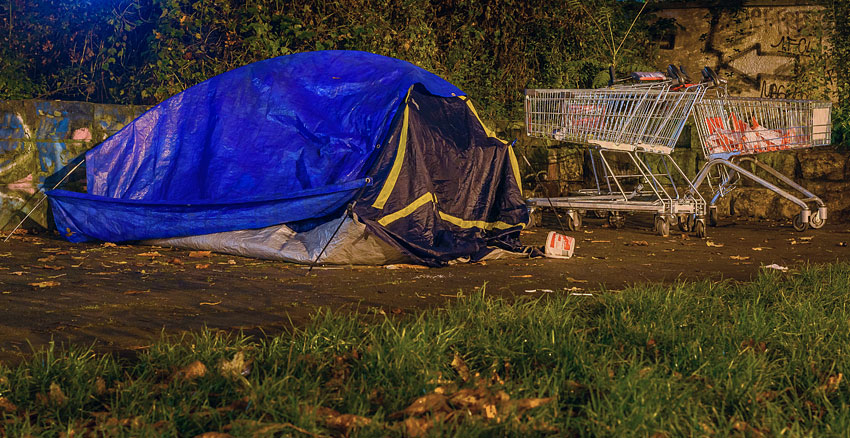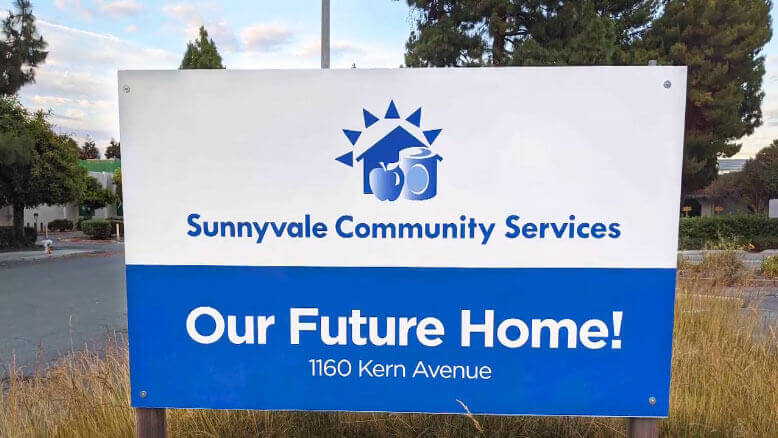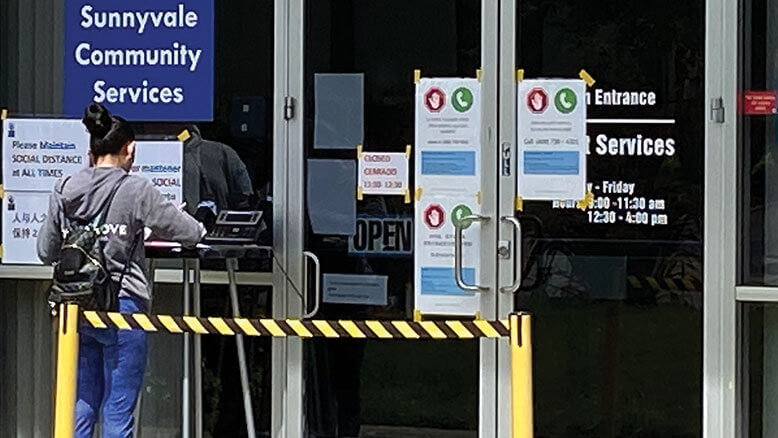Posts by Mike Mantecon
To End Hunger, We Need Affordable Housing
A new White House initiative aims to end hunger in the U.S. by 2030, using a holistic approach to address hunger and bolster economic security for families across the nation.
Ending hunger starts with housing.
In the Bay Area, the high cost of housing is the primary reason people cannot afford to feed their families. Last year, nearly half of the people coming to Sunnyvale Community Services (SCS) agency seeking financial assistance were burdened with rent that is over 90% of their income. Low-wage workers and seniors on fixed incomes must make daily choices, sacrificing medicine, education, and food just to stay housed. Without safe and affordable housing, families also lose access to healthcare, transportation, and their dignity.
Once a person becomes homeless, it’s even harder to ensure access to adequate and healthy food. Food assistance from SCS helps families use their limited resources toward paying rent and remaining housed. But the enduring pandemic coupled with inflation and continuing lay-off notices have made living in the Bay Area even more challenging. Now, more than ever, local families and seniors are just one bill away from becoming homeless.
For decades, our slogan was “Business is booming, and that’s not good.” Our food distributions are now exceeding all past records, especially for children and seniors. More than 3,000 individuals are coming for groceries each month, and our food deliveries to seniors and homebound individuals have more than doubled since the start of COVID.
In Silicon Valley, the lack of adequate housing is at the heart of food insecurity.
Feeding our neighbors is a shared responsibility, and we are encouraged that government is making the fight against hunger a priority issue in all communities. But it will take more than food distributions to end hunger. Housing and food go together. We are shining a spotlight on the urgent need for more affordable housing here in Sunnyvale and Silicon Valley, so that families and seniors here can thrive, with their basic needs met.
We will share more about our plans in the coming months. Thank you for your help in preventing homelessness and hunger in our community!
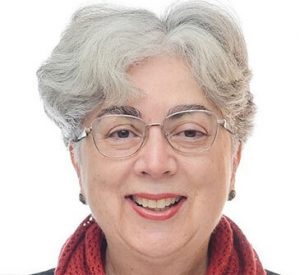 Marie Bernard
Marie Bernard
Executive Director, Sunnyvale Community Services
Ready to Play, Ready to Learn
Summer is here, and children are smiling as they breathe in the fresh air and look forward to days full of laughter with friends. But for many Sunnyvale children, summer is also a time of anxiety. Here in Silicon Valley, one in four children are at risk of hunger. They depend on school meal programs for their basic nutrition, and during the summer months when schools are closed, they are missing meals. For over 25 years, SCS has provided additional kid-friendly food each summer to families enrolled in our food program. This summer promises to be our biggest year yet, with more families than ever struggling with dramatically rising costs of staples like milk, eggs, and cereal.
In August, we look forward to providing each family not only with much needed groceries, but also with a special box for each child stuffed with age-appropriate school supplies. Each child also receives a $100 Target gift card, enabling families to choose exactly what they need to start the school year. Our drive-through Ready to Learn program will serve a record number of 2,000 Sunnyvale students as they prepare for a new school year.
Our summertime program helps families stretch their money so they can pay the rent and keep the lights on. It also aims to keep smiles on young faces, so that instead of worrying about whether they will have enough food to eat, they can spend their time laughing and playing outside in the bright summer sunshine. Thank you for supporting our most precious Sunnyvale neighbors.
Guest Post: A Point in Time
At five in the morning, we set out. In teams of two or three, we comb abandoned buildings, creek beds, and parks. Quiet tucked-away areas, dumpsters, and parking lots. After a while, we’ll spot it: a blue tarp, a full shopping cart, or a car filled with belongings. One of us marks it down and colors our map.
It’s called the Point-in-Time (PIT) Count, and it's an important event that happens once every two years. U.S. counties count people experiencing homelessness within their borders and report their findings to the U.S. Department of Housing and Urban Development (HUD).
HUD uses these findings to estimate the homeless population in each city and determine how much federal funding to give to each state, county, and city to address those needs. So, it’s vital that counties provide an accurate count. Unfortunately, it’s much harder to cover all the ground when you don’t have enough volunteers, and due to a surge in COVID-19 omicron variant, Santa Clara County had trouble recruiting volunteers this year. That’s why SCS, along with three other organizations, stepped up to do the PIT Count for Sunnyvale.
…the PIT Count data helps us see for ourselves: How is the health of our city?
For SCS, there’s a lot on the line. The PIT Count determines the amount of funding we get from government grants related to homelessness prevention. But also, the PIT Count data helps us see for ourselves: How is the health of our city?
As I surveyed my own neighborhood for the PIT Count, I found myself peering into a part of the world I usually pretend not to see. People panhandling at busy intersections. Tent cities. Lines of RVs parked on the side of the street. To solve a problem, we must stop pretending it’s not there. And that heart-breaking truth is the key that will lead us to more answers. As a staff member of Sunnyvale Community Services, I am grateful to be part of the solution.
 Gwen Leong
Gwen Leong
Marketing and Communications Specialist, Sunnyvale Community Services
We’re Moving to a Larger Home in Sunnyvale
When we moved into our current building in 2003, we never imagined we’d run out of space. Since that time, we have increased our food distribution days from four per month to 22, with an average of 905 families coming every Produce Monday. The generosity of our supporters, including 2,500 volunteers, makes it happen, but our current site limits our services. We’ve utilized every inch of space and positioned staff at satellite offices in Sunnyvale.
After much planning and preparation, we are ready to take this next step and enhance our ability to serve our community. SCS is happy to announce that we are looking to move into a larger building in 2020. In preparation for the move, the City of Sunnyvale has agreed to buy our current building and allow SCS to remain here until our new building is move-in ready.
We have received seed funding from the City of Sunnyvale, Jay Paul, LinkedIn, the SCS Board of Directors, and many individual donors. But we need your help. It’s going to take a village to help us buy a new building.
Please join us! As you plan your annual giving to SCS, we ask that you consider an additional gift to our building fund.
We will share more about our plans in the coming months. Thank you for your help in preventing homelessness and hunger in our community!
 Marie Bernard
Marie Bernard
Executive Director, Sunnyvale Community Services
Pivoting During the Pandemic
Over the past several weeks, the COVID-19 crisis has impacted the everyday lives of the people we serve, our volunteers, and our community. With mandated actions like “shelter in place” and “social distancing,” we’ve cancelled plans for our 50th Anniversary event and totally redesigned all of our services.
For the health and safety of our clients and employees, we closed our doors to walk-in traffic and installed an outdoor intercom system so we could speak with clients while they remained outside the building. Before long, a line began to form. We were flooded with 607 requests for financial aid between March 16 and April 16, six times our usual rate. We have dropped off food to over 200 Sunnyvale seniors sheltered in their homes and continue to deliver biweekly food to our 137 homebound clients. And since we’ve had to curtail physical donations for safety reasons, we are purchasing baby formula, diapers, and other critically essential items for families.
The need is great. But we’ve had help throughout this crisis. Individuals, businesses, community organizations, and foundations have all sent contributions and words of encouragement. The City of Sunnyvale made an early commitment of $250,000 to financially assist Sunnyvale residents in need. The city has also provided their staff as volunteers, including bilingual employees to help us follow up with client requests and drivers to deliver homebound food.
We may need to have a drive-through Backpack Day, a virtual Holiday Auction, and a Holiday Gift Card Center.
Many other significant donors are noted on this page—and we thank one and all for your continued support and assistance. The future is unclear, but we know how important it is to continue SCS programs and traditions that have always brought our community closer together.
We may need to have a drive-through Backpack Day, a virtual Holiday Auction, and a Holiday Gift Card Center.
It’s been our joy to share stories of our 50 years of service via our e-newsletter, and we look forward to celebrating with our community in creative ways in the months ahead. As we’ve done successfully for half a century, we will continue to serve those in need and work to prevent homelessness and hunger here in our local community.
 Marie Bernard
Marie Bernard
Executive Director, Sunnyvale Community Services
How well did you sleep last night?
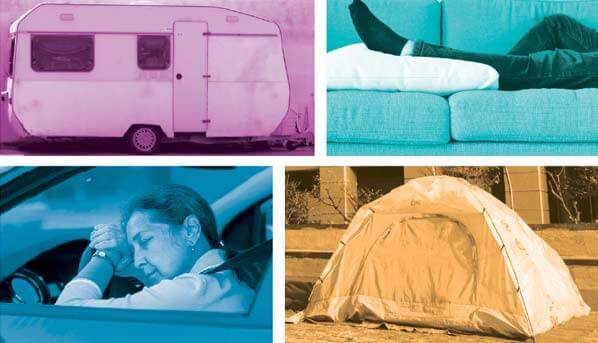
In our role as the community’s safety net, we’ve received a growing number of calls from residents, businesses, and Public Safety about RV and car encampments in Sunnyvale, asking SCS to reach out to people living in their vehicles and connect them to our services. Our case workers and partners at Downtown Streets Team knock on doors, wave through windows, and leave information sheets. We find that many people living this way are working during the day. But with no place to live, they are constantly looking for safe, well-lit places to park at night.
One of the first questions our case workers ask is, “How did you become homeless?” We know from our own data that loss of income is the leading cause of evictions for many people here in our community. But, loss of income doesn’t always mean loss of a job. More than 1/3 of workers at small businesses (under 100 employees) don’t have sick time, which means if they miss work for an illness, they are not paid. Part-time workers don’t have steady work shifts from week to week. A loss of just a few hours of work can lead to losing one’s home.
Many people sleeping in RVs and cars are hoping it’s a temporary situation until they are able to find more permanent housing. Unfortunately, their options are limited if they want to live close to jobs. For teachers, nursing assistants, car mechanics, and bus drivers, affordable housing is often 40+ miles away.
We are grateful for the generosity and caring concern shared by all of you—our neighbors helping neighbors. Thank you!
SCS has responded to this new reality, with specialized services to prevent homelessness and quickly help people find housing. We now have dedicated Housing Case Managers who focus on connecting landlords and tenants. A Benefits Specialist connects residents with government services. Financial coaching helps renters improve their credit scores. For the most vulnerable, we have intensive Case Management services, helping to stabilize families. Our year-found food program has also expanded from four to 22 distribution days each month, allowing a family of four to receive food valued at $462/month.
The housing crisis and the growing income divide will not be easily fixed. SCS continues to advocate for policies and programs that will help low-income residents.
 Marie Bernard
Marie Bernard
Executive Director, Sunnyvale Community Services
Broadening our Support, Inside & Out
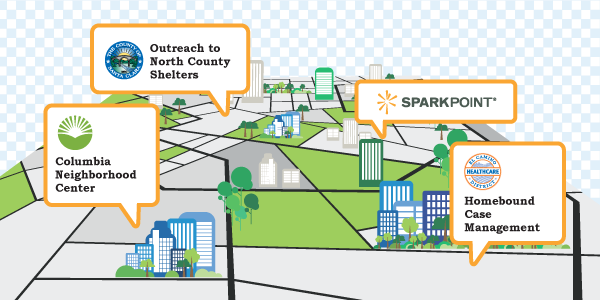
Last year SCS helped 8,300 individuals with safety net services, including food to stay healthy, and financial support to stay housed or gain housing after being homeless. Every year we see a deepening need as the income gap widens in Silicon Valley. This year we are making an effort to add improvements to our support and extend our services deeper into the community, because we know that there are many more of our neighbors who are struggling to make ends meet. Some of the new programs and services we are providing include:
Sparkpoint - a United Way Bay Area Financial Training Program: One afternoon each week our Case Management clients come to SCS for scheduled financial coaching and credit counseling with a professional credit counselor. Working together, they develop plans to better manage their income, with an eye towards a stable future.
Homebound Case Management: Through generous funding from El Camino Healthcare District, our Case Management services will now reach eligible homebound clients currently enrolled in SCS food programs for seniors. Case Managers will conduct home visits to ensure these clients are being connected to crucial services.
Referrals and Outreach to North County Shelters: SCS caseworkers do intake referrals, and our Housing Case Manager visits the homeless shelter in Sunnyvale each week to reach out to families and individuals eligible for SCS’s rapid re-housing services.
Every year we see a deepening need as the income gap widens in Silicon Valley.
Coming Soon!
Columbia Neighborhood Center: We will hold office hours 1 - 2 days each week at this neighborhood location to deliver services to clients who cannot come to our main office. This will extend our reach into the community, building awareness of the services we offer, and providing convenience to those who otherwise might not be able to ask for help.
Sunnyvale Library: Once a week a caseworker will conduct outreach to homeless clients at the library, providing resource referrals and connecting them to SCS for case management. These and other outreach efforts mean that more people who need help will be served, making Sunnyvale a stronger, more resilient community. SCS continues to work to provide the best support possible to our neighbors in need.
 Marie Bernard
Marie Bernard
Executive Director, Sunnyvale Community Services
Everyday Disasters
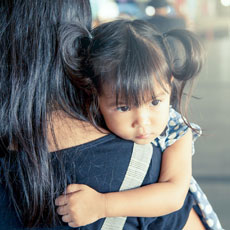
Recently, the nation held its collective breath as hurricanes and earthquakes wreaked havoc, destroying lives and neighborhoods, and leaving thousands homeless. Natural disasters around the country and the world serve as a reminder of how one event can drastically change lives.
At Sunnyvale Community Services, we prepare for emergencies so we can help others when a crisis happens. Thanks to support from our community, our building has been retrofitted for stability in case of an earthquake. We partner with Sunnyvale Public Safety and the Red Cross to train our staff for medical emergencies and disaster preparedness.
But disasters can also be more personal—a loss of income, a rent increase, a work injury, a car accident, a death of a loved one. A family’s financial stability can be devastated by changes in benefits, such as cuts to food stamps for a working family, or changes to Medi-Cal coverage for households that need routine or emergency healthcare. Every day, the stress of trying to make ends meet makes it harder to deal with the next emergency. Families living on the edge in Silicon Valley worry all the time.
Last year, we assisted 529 people who were homeless—a shocking increase of 49% in just one year.
For low-income residents who live paycheck to paycheck, Sunnyvale Community Services (SCS) is their safety net. An increasing number of those affected by personal emergencies fill our front lobby. The most dramatic increase has been in the number of homeless individuals we helped. Last year, we assisted 529 people who were homeless—a shocking increase of 49% in just one year. Sadly, children under 18 were 17% of the homeless persons we served, and adults 50 or older were 40%. The total number of people we served in the past fiscal year, 8,300, was a 20% increase in just two years.
SCS’s financial aid and food distributions help to bridge the gap for low income families and seniors struggling in Silicon Valley. In August, a record number of 946 families came on a single “Produce Monday.” Every day, SCS provides additional food, toiletries, diapers, and other necessities for our neighbors in need.
We’re grateful that the community continues to support the most needy in our neighborhood here in Silicon Valley. Together we can build a better community, where everyone has a safe place to call home, with food on their table, and the lights turned on. Thank you!
 Marie Bernard
Marie Bernard
Executive Director, Sunnyvale Community Services
On the Streets Where We Live

We Californians love our cars, but few of us would want to sleep in our vehicles. Sadly, that is happening more frequently for many Sunnyvale residents. Seniors, couples, and families with children who are evicted from their homes want to stay near the schools and jobs and the neighborhoods they know—so they park their cars on local streets. The person serving you at a local restaurant or cleaning your house may not have a home to go to after work. The front seat of their car is their living room.
The person serving you at a local restaurant or cleaning your house may not have a home to go to after work.
Living in Sunnyvale, we have a lot at stake in the future of Silicon Valley. The housing crisis and transportation challenges are affecting long-time residents who have lived in Sunnyvale for decades. Access to affordable housing can help hard-working families with children live where they work and go to school, and allow seniors and Veterans on fixed incomes to remain in the community where they spent their lives. Without this access, seniors, children, and grandchildren risk being forced to move out of the area, and those who remain risk losing some of the rich tapestry of an inclusive community.
Sunnyvale has always been a welcoming community. Our community voted overwhelmingly to support Measure A, which will raise nearly $1B over the next 30 years for low-income housing and first-time home buyers in Santa Clara County. Voters also approved Measure B, which will raise much-needed funds for improved public transportation and road repairs. Our State of California government is also considering infrastructure and housing initiatives that can improve the quality of life for all residents. Sunnyvale Community Services stands with these efforts.
Sunnyvale Community Services never turns away an eligible person for lack of funds or food.
Sunnyvale Community Services never turns away an eligible person for lack of funds or food. Our roots go deep, and thanks to continued community support, we’ve been able to serve those less fortunate amidst the successes and challenges of Silicon Valley. We are grateful for the thousands of volunteers and donors who make it possible to serve 8,000 of our neighbors in need every year.
 Marie Bernard
Marie Bernard
Executive Director, Sunnyvale Community Services
It’s Hard to Learn When You’re Hungry…

In many Sunnyvale classrooms, stomachs are grumbling. Last spring, local teachers and principals let us know that students were coming to school hungry on Monday mornings. Working families were making difficult choices as they juggled bills to pay, and food often ran out on the weekends. Sunnyvale Community Services worked with school staff and parents to pilot the Weekend School Food Program.
One in four children in Silicon Valley are “food insecure”—not knowing if they will have food every day. Numerous studies show that children who live in food insecure households have worse performance in math and reading, lose school days because of illness, repeat grades, and have overall lower academic achievement scores due to lack of nutrition (AAP Institute for Healthy Childhood Weight).
One in four children in Silicon Valley are “food insecure”—not knowing if they will have food every day.
Addressing Food Insecurity
In our role as the safety net in Sunnyvale, we have seen continued growth in the frequency of families coming for food assistance. Second Harvest Food Bank’s survey of 800 of their local clients in 2015 showed that 66% have had to choose between paying for food or paying for other necessities such as utilities, housing, medicine, or transportation.
According to the Food Research and Action Center (FRAC), poor nutrition contributes to poor health, leading to increased diabetes risk, increased obesity risk, and increased risk of heart disease. It’s ironic that food insecurity and poverty also puts low-income children at risk of obesity, due to lack of access to healthy, affordable foods, fewer opportunities for physical activity, cycles of food deprivation and over-eating, high levels of stress, and limited access to health care.
In response to this growing need for healthier food, we now have nutritious food distributions every weekday. Over 50% of the food we distribute is healthy produce and 20% is lean proteins. A family of four who participates in all eligible food programs can receive healthy food valued at $396.00 each month, helping to close the food security gap and increase nutrition.
We have recruited hundreds of new volunteers and raised funds to fuel our food program growth. Thankfully, the community has responded with their time and their financial support.
 Marie Bernard
Marie Bernard
Executive Director, Sunnyvale Community Services


